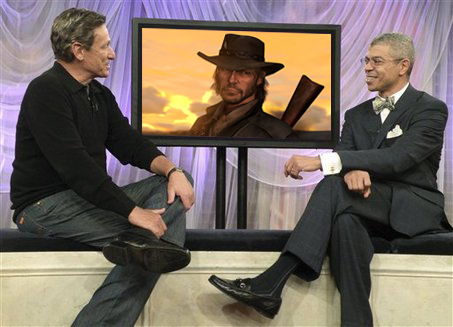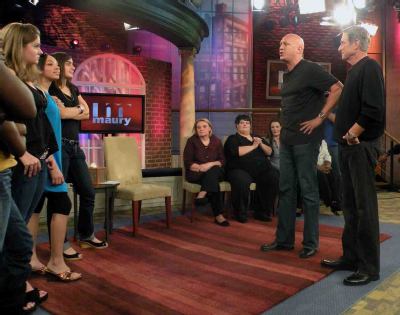This post has not been edited by the GamesBeat staff. Opinions by GamesBeat community writers do not necessarily reflect those of the staff.
Maury Povich stares suspiciously at his guest. “So let me get this straight,” he says, his distinguished features furrowed in a frown. “You’re telling me that your husband was in the Wild West for the better part of two months, and you believe he was sleeping around?”
“Yes Maury!” Abigail Marston says, fighting back tears. “I use to run with his gang, and I know what it’s like. I just know he’s gone back to his womanizing ways. He's been sleeping with cheap whores and fast women, I just know it. He came back with over 10 outfits! He was disguising himself and sleeping around.” The audience boos riotously.
“And you never even got a telegram? Two months and no telegram?” Maury asks, his hand on Abigail’s knee to comfort her. She shakes her head sobbing.

“Well, let’s bring John Marston out!” cries Maury, to the uproarious disapproval of the audience. John Marston enters the soundstage sheepishly and sits down amidst the catcalling.
“John, you had quite the adventure,” says Maury, his eyebrow cocked.
“I did, sir.”
“But you say you remained faithful to your wife?”
“I do, sir.”
“And you didn’t even send a telegram? And you were gone two full months?!?”
“My wife can’t read. I thought it would be an insult.”
Maury turns to the camera. “We submitted John to a lie detector test, and the results are in! We’ll be back after these messages.”
My wife and I have an expression. Nearly every day we “fall into the Maury hole.” On the east coast of Canada, we get American daytime television programs in the early evening, and we usually end up watching Maury. In theory, we don’t want to watch Maury Povich’s trash-talk show, but once you watch it for five minutes, you need to know whether a particular man is the real father of his kids (or that he’s cheating on his wife). One story leads to the next, and this constant “next thing” motivation leads the unsuspecting viewer to watch the whole damn show.
That’s a little bit like Red Dead Redemption. I try to focus on getting through the story missions, but more often than not, I see a snake to kill, or that a scrap for an outfit is in the region, or a stranger needing help. Once I complete that, I have to do some other small task. It’s infinite regression, and before I know it, I’ve played for two hours and haven’t really done anything.
This “just one more thing” is not exclusive to Red Dead Redemption or the Maury Show. In fact, it drives a lot of a media consumption, whether a video game or a television show. But the similarity got me thinking that publisher/developer Rockstar’s stellar effort and the new king of daytime TV have a lot more in common.
The unstoppable character of Americana
Rockstar makes mature games and not in the way the ESRB defines the adjective. The developer has a knack for using satire to reveal the modern state of American culture, whether it’s in their flagship franchise Grand Theft Auto or their “smaller” games like Bully and Red Dead Redemption. Rockstar’s storytelling offers considerable depth to the discerning player.

While Red Dead takes place over a hundred years ago, it’s interesting commentary on what happens to the American character if left to evolve naturally without law. Early in my playthrough of the game, I was struck with how the story dealt with death: The three missions in chase of a cannibal, picking flowers for the dead wife of Billy West, and the grave-digging of Seth Briars. In short, the characters of Red Dead Redemption have a massive “death management” problem — characters are violating taboos left, right, and center.
The content of Maury’s show also explores the violation of social norms. It explores the excess of American culture that’s fueled by its prosperity: fat babies, violent and promiscuous teens, and unfaithful wives and husbands. Unlike the many versions of this type of show, Maury is able to give closure to its guests with lie detectors and DNA testing.
In both forms of media, the audience cannot help but watch with a mixture of glee and horror. And if you were to use either as an example of real-life America, you can conclude that no one can keep a body in the ground…or their privates in their pants.
The messenger and his message
What strikes me most about Red Dead Redemption is John Marston’s dedication to what he believes is right. You can shoot up New Austin and cause an unholy ruckus, but unlike the Grand Theft Auto games, the protagonist is likable and good. Simply by inhabiting his space, we have to hold to his moral code. This code is given to the player through the cutscenes, where John expresses his desire for a simple life, that he has a wife and kid, and that he’d rather not be completing his task. For my part as the player, I feel guilty for shooting the prostitute instead of her kidnapper, and I when I have done wrong, my first stop is usually the telegram office where I can repay my literal debt to society. The craziness of Red Dead’s story is emphasized by the do-good behavior and attitude of its protagonist.

Maury Povich is also a moral figure. While he regularly talks to some of the most despicable people in America — or at least reasonable people who have done despicable things — he has a moral code that is triggered in nearly every segment. When a man denies that he is a father, Maury demands that his guest will care for the child if the results are positive. When a man learns that his wife gave birth to the child of another man, Maury encourages the new non-father to care for the child as his, much like he has done in his own marriage. He wants to put a stop to destructive relationships, and he wants those mothers to stop feeding so much to those kids.
In both instances, the message is worthless without the crazy world from which the marriage is delivered, and the strength of that message is based solely on the moral character of the man who delivers it.
Red Dead Redemption and the Maury Show are still very different enterprises. The video game pushes its medium to new heights, while the show is, arguably, a new low for television. Both reveal, however, the more distasteful elements of the American character and try to address those parts of our culture with morality. Whether we learn the lessons from either depends on us as the audience and whether we want to see them as light entertainment or as something more.
Maury takes a manila envelope from his producer. “We have the results right here.” He takes out a piece of paper and puts on his glasses. Abigail Marston looks on apprehensively.
“We asked John whether he collected all those disguises in order to manipulate woman and sleep with them. John said ‘No’ and the lie detector determined….” Maury pauses for effect. “…that John was telling the truth.”
Abigail weeps joyfully.
“We asked John if he didn’t send a telegram because he didn’t want to insult his illiterate wife. John said ‘Yes’ and the lie detector determined…that John was telling the truth.”
John nods knowingly.
“We asked John if he told everyone he met in New Austin that he had a wife and child and all he wanted was a simple life. John said ‘Yes’ and the lie detector determined…that John was telling the truth.”
Abigail runs across the stage to hug her husband.
“We asked John if he slept with any other woman while chasing his former friend Bill Williamson. John said ‘No’ and the lie detector determined…that John was telling the truth.”
Abigail cries into her husband’s shoulder.
Maury applauds along with the audience.
Before cutting to commercials, two questions appear on screen in a stylized font alongside a 1-800 number.
“Is your village overrun by zombies? Did you break one of the four horses of the Apocalypse? We want to hear from YOU for a future show.”